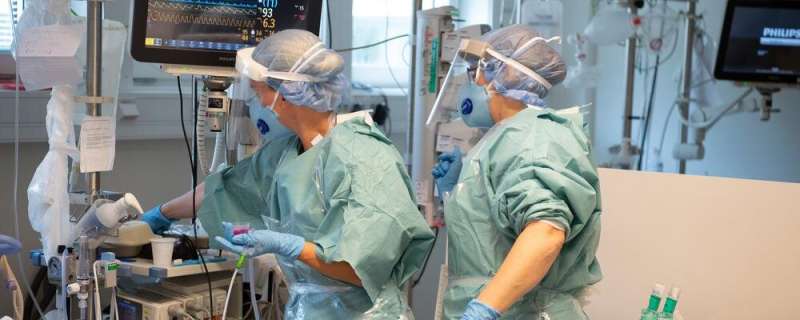Fatigue is highly common after intensive care for COVID-19

A one-year follow-up study of the first wave of ICU patients in Gothenburg after intensive care for severe COVID-19 showed that fatigue was very common among them. Of the 104 questionnaire respondents, 67 stated that they were fatigued. This was one of the main findings from the study published in Scientific Reports, which was conducted by researchers at the University of Gothenburg and Sahlgrenska University Hospital.
The patients involved in the study were those most severely affected by COVID-19 when they sought care. They were mostly male, and the majority required mechanical ventilation during their stay in the intensive care unit (ICU), but for a small number, oxygen treatment sufficed. Of the total of 259 patients admitted to one of Sahlgrenska University Hospital's five ICUs in the period from March to June 2020, 182 met the study inclusion criteria. At one year follow up after ICU care for COVID-19, 104 of the participants gave responses to enough statements in the questionnaire to be categorizable as either "fatigued" or "not fatigued."
The investigators emphasize that their sample size is small. More than half (104 out of 182) of the patients invited to take part in the study responded positively. In terms of both age and duration of care, the non-responders match the group included in the study.
Widespread exhaustion
One year after their admission to intensive care:
- 24 people (corresponding to 22.8 percent) stated that they had never, or only occasionally, had enough energy to cope with life on an everyday basis
- 21 (20 percent) stated that they always or often found it difficult to start activities
- 20 (19 percent) stated that they often or always felt mentally drained or exhausted
- 70 of the 104 (67.3 percent) stated that they experienced physical fatigue.
Sense of fatigue
Two factors were found to be associated with lesser fatigue at one year after ICU admission following COVID-19: shorter ICU stay and advanced age. The study participants' average age was 58.2 years. Twenty-nine patients were aged 65 or over. The researchers were surprised to find that older age proved to be an associated protective factor against fatigue, but since this was an observational study, causal relationship between the two could not be established.
"People of working age may be subject to heavier demands in everyday life, so fatigue might be more palpable for them. Younger individuals might also be inclined to report greater fatigue because they notice a more marked decline in their health after COVID-19 than their older counterparts, who may already have experienced age-related physical deterioration," says Netha Hussain, a doctor at Sahlgrenska University Hospital.
Hussain, who obtained her doctorate at the University of Gothenburg, is the corresponding author of the study.
Vital to follow up
The results are now published in the journal Scientific Reports. The study is expected to have relevance for various agencies that assess work capacity in connection with ill health. The results can serve to support rehabilitation planning for individuals after severe COVID-19.
"For staff in health care, it is important to follow up how things have gone for our patients and investigate whether there are factors that we could have influenced to improve the outcome," says Carina U Persson, Associate Professor in Rehabilitation Medicine at the University of Gothenburg and Chief Physical Therapist at Sahlgrenska University Hospital, who leads the research and is the study's last author.
More results to come
This study is the first one to be published from the cohort of Gothenburg Recovery and Rehabilitation after COVID-19 and Intensive Care Unit Study (GOT-RECOV-19 ICU), conducted by researchers working at the University of Gothenburg, Sahlgrenska University Hospital and Nottingham University, Professor Avril Drummond.
The study participants have also undergone various physical tests, but the researchers have not analyzed all the data yet. In the research project, there are also plans to follow up all the patients cared for in one of the five ICUs for severe COVID-19 during the first wave of the pandemic. The aim will be to investigate, using medical records, the prevalence of various complications in these patients. The work will also involve a qualitative part focusing on the patients' experiences of recovery and rehabilitation after severe COVID-19.
More information: Netha Hussain et al, Prevalence of fatigue at one-year follow-up from the Gothenburg recovery and rehabilitation after COVID-19 and intensive care unit study, Scientific Reports (2022). DOI: 10.1038/s41598-022-14787-6


















